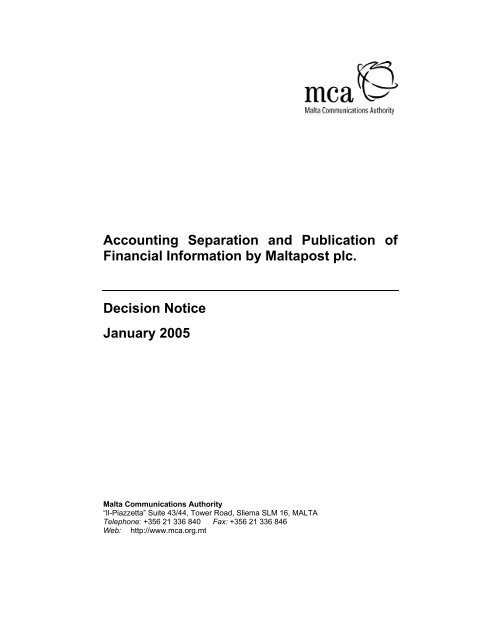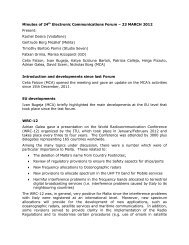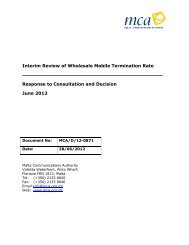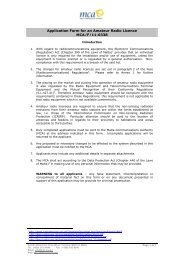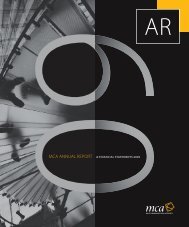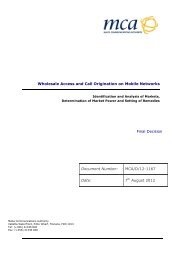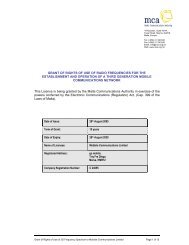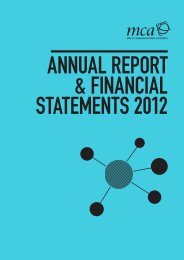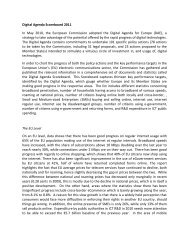Accounting Separation and Publication of Financial Information by ...
Accounting Separation and Publication of Financial Information by ...
Accounting Separation and Publication of Financial Information by ...
You also want an ePaper? Increase the reach of your titles
YUMPU automatically turns print PDFs into web optimized ePapers that Google loves.
<strong>Accounting</strong> <strong>Separation</strong> <strong>and</strong> <strong>Publication</strong> <strong>of</strong><strong>Financial</strong> <strong>Information</strong> <strong>by</strong> Maltapost plc.Decision NoticeJanuary 2005Malta Communications Authority“Il-Piazzetta” Suite 43/44, Tower Road, Sliema SLM 16, MALTATelephone: +356 21 336 840 Fax: +356 21 336 846Web: http://www.mca.org.mt
<strong>Accounting</strong> <strong>Separation</strong> <strong>and</strong> <strong>Publication</strong> <strong>of</strong> <strong>Financial</strong> <strong>Information</strong> <strong>by</strong> Maltapost plc.Decision Notice – January 2005Table <strong>of</strong> Contents1 Introduction 12 Regulatory Accounts 23 <strong>Accounting</strong> <strong>Separation</strong> 33.1 Legislation 33.2 Categories 43.3 Other Compliance 43.4 Cost Allocation 63.5 Practical issues 74 Audit 104.1 General Requirement 104.2 Appointment <strong>of</strong> Auditors 104.3 Auditors’ Independence 114.4 Timetable for the Preparation <strong>of</strong> Regulatory Accounts 125 <strong>Publication</strong> <strong>of</strong> Regulatory Accounts 13Appendix 1 – Template for Separated Accounts 14
<strong>Accounting</strong> <strong>Separation</strong> <strong>and</strong> <strong>Publication</strong> <strong>of</strong> <strong>Financial</strong> <strong>Information</strong> <strong>by</strong> Maltapost plc.Decision Notice – January 20051 IntroductionThe Malta Communications Authority has been designated with theresponsibility <strong>of</strong> regulating the Postal Sector under the Postal Services Act(Cap 254) with effect from 1 June 2003.Legal Notice 296 <strong>of</strong> 2004 designates Maltapost plc as a universal serviceprovider with an obligation to provide all the universal services required <strong>by</strong> orunder the Postal Services Act.One <strong>of</strong> the main pillars <strong>of</strong> the Regulatory Framework for Postal Services is theestablishment <strong>of</strong> principles governing transparency <strong>of</strong> accounts, in order toensure transparency <strong>and</strong> non-discrimination in tariffs. This is achieved throughthe implementation <strong>of</strong> cost accounting systems <strong>and</strong> accounting separationwithin the Postal Services operating environment.This Decision establishes the framework under which Maltapost plc as theUniversal Service provider shall prepare separated accounts.This Decision deals exclusively with the preparation <strong>and</strong> submission <strong>of</strong> annualRegulatory Accounts. The MCA shall continue liaising with Maltapost in relationto other work streams such as the establishment <strong>of</strong> an RPI-X price controlmechanism. Separated financial <strong>and</strong> cost accounting information can berequested from Maltapost plc on an ad hoc basis, as may be necessary fromtime to time in relation to other regulatory obligations.1
<strong>Accounting</strong> <strong>Separation</strong> <strong>and</strong> <strong>Publication</strong> <strong>of</strong> <strong>Financial</strong> <strong>Information</strong> <strong>by</strong> Maltapost plc.Decision Notice – January 20052 Regulatory AccountsThe regulatory accounts shall be based on the audited statutory financialstatements <strong>of</strong> the regulated business. They shall be used <strong>by</strong> the MCA tomonitor <strong>and</strong> measure the performance <strong>of</strong> the regulated entity <strong>and</strong> also tosupport the price control process. The three fundamental prioritiesunderpinning the requirement to prepare regulatory accounts <strong>by</strong> Maltapost plcare as follows:−−−Service PerformancePrice ControlCompetitionRegulatory accounting issues can be considered under the following headings:1. <strong>Accounting</strong> <strong>Separation</strong>a) Legislationb) Categoriesc) Other Complianced) Cost Allocatione) Practical Issues2. Audit3. <strong>Publication</strong> <strong>of</strong> Regulatory Accounts2
<strong>Accounting</strong> <strong>Separation</strong> <strong>and</strong> <strong>Publication</strong> <strong>of</strong> <strong>Financial</strong> <strong>Information</strong> <strong>by</strong> Maltapost plc.Decision Notice – January 20053 <strong>Accounting</strong> <strong>Separation</strong>3.1 LegislationArticle 23 <strong>and</strong> the Third Schedule <strong>of</strong> the Postal Services Act <strong>of</strong> Malta requires:1. The Universal Service Provider to maintain separate accounts within itscost accounting systems, for each <strong>of</strong> the services within the reservedarea on the one h<strong>and</strong> <strong>and</strong> the non – reserved area on the other.a. Accounts for the non-reserved area shall clearly distinguish betweenservices which are part <strong>of</strong> the universal service <strong>and</strong> services whichare not,b. Such internal accounting systems shall operate on the basis <strong>of</strong>consistently applied <strong>and</strong> objectively justifiable cost accountingprinciples.2. Costs shall be allocated to each <strong>of</strong> the reserved <strong>and</strong> non-reserved areaservices respectively in the following manner:a. Costs which can be directly attributed to a particularservice/business segment,b. Common costs, i.e. costs that cannot be directly attributed to aparticular service, shall be allocated as follows:• Whenever possible, common costs shall be allocated on thebasis <strong>of</strong> direct analysis <strong>of</strong> the origin <strong>of</strong> the costs themselves,• When direct analysis is not possible, common costcategories shall be allocated on the basis <strong>of</strong> an indirectlinkage to another comparable cost category or group <strong>of</strong>comparable cost categories for which a direct assignment orallocation is possible,• In the absence <strong>of</strong> either a direct or indirect measure <strong>of</strong> costallocation, the cost category shall be allocated pro rata to thetotal <strong>of</strong> all other allocated costs.3. Other cost accounting systems may be applied if they are compatiblewith the cost accounting principles established in this Decision <strong>and</strong>which have been approved in writing <strong>by</strong> the Malta CommunicationsAuthority,4. The compliance <strong>of</strong> the Universal Service Provider (USP) to these costaccounting systems shall be verified annually <strong>by</strong> a competent bodywhich is independent <strong>of</strong> the Universal Service Provider,3
<strong>Accounting</strong> <strong>Separation</strong> <strong>and</strong> <strong>Publication</strong> <strong>of</strong> <strong>Financial</strong> <strong>Information</strong> <strong>by</strong> Maltapost plc.Decision Notice – January 20055. The MCA shall keep available information on the cost accountingsystems applied <strong>by</strong> the Universal Service Provider,6. The Authority may request the Universal Service Provider (USP) toprovide, in confidence, detailed cost accounting <strong>and</strong> financialinformation as required <strong>by</strong> the Postal Services Act.3.2 CategoriesThe Separated Accounts should be segmented on the basis <strong>of</strong> the followingcategories which collectively comprise the postal services provided <strong>by</strong> theUniversal Service Provider:• Services in the reserved area,• Services in the non-reserved area, which are part <strong>of</strong> the universal postalservice,• Non-reserved services, which are not part <strong>of</strong> the universal postalservice.The Regulatory Accounts should also be separated to show:• Non-postal activities.3.3 Other ComplianceThe Postal Services Act states that “The universal service provider shallcomply with one <strong>of</strong> the cost accounting systems described in paragraphs 1 <strong>and</strong>2 which shall be verified <strong>by</strong> auditors independent <strong>of</strong> the provider <strong>and</strong> theexpense <strong>of</strong> such auditors shall be paid <strong>by</strong> the provider. The provider shallpublish a statement concerning compliance in two daily newspapers at leastonce every calendar year” 1 .The regulatory accounts should also:• Include the auditors’ verification statement,• Comprise a pr<strong>of</strong>it <strong>and</strong> loss account, <strong>and</strong>, unless the MCA agreesotherwise in writing, a balance sheet, <strong>and</strong> explanatory notes, includingthe accounting policies adopted,• Explain the licence <strong>and</strong> regulatory requirements relating to accountingseparation,1 Postal Services Act , Third Schedule, Article 23, para 44
<strong>Accounting</strong> <strong>Separation</strong> <strong>and</strong> <strong>Publication</strong> <strong>of</strong> <strong>Financial</strong> <strong>Information</strong> <strong>by</strong> Maltapost plc.Decision Notice – January 2005• Include information about the cost allocation methodologies used toproceed from the accounting records to the regulatory statementsnoting the key drivers <strong>of</strong> cost allocation,• Show the reconciliation with the statutory accounts,• Show prior year figures (with the exception <strong>of</strong> year 1),• Details <strong>of</strong> significant changes that have an impact on the financialstatements <strong>and</strong> prior year restatements shall be disclosed,• Split the licensed services category which are part <strong>of</strong> a universal postalservice to show 0 to100g separately,• Provide a separate Pr<strong>of</strong>it <strong>and</strong> Loss account for each service categoryfalling within the Universal Postal Service Obligation (USO) e.g. Lettersseparated from parcels,• Cost <strong>and</strong> revenue data attributable to each service within the USOshould be separately identified,• Be supported <strong>by</strong> accounting <strong>and</strong> financial records maintained for aperiod <strong>of</strong> six years in case <strong>of</strong> documents outside the scope <strong>of</strong> theCompanies Act.As a general principle, the regulatory accounts should include <strong>and</strong> discloserelevant supporting information, which would assist users to underst<strong>and</strong> thebasis <strong>of</strong> preparation <strong>and</strong> presentation <strong>of</strong> the accounts.Other issues might be relevant in addition to the licence or in the subsidiarylegislation:• The Licensee should prepare annual statutory accounts in accordancewith International <strong>Financial</strong> Reporting St<strong>and</strong>ards <strong>and</strong> the MalteseCompanies Act 1995 <strong>and</strong> should have these audited <strong>by</strong> competentindependent auditors <strong>and</strong> published in accordance with the ThirdSchedule (Article 23) <strong>of</strong> the Postal Services Act,• The Licensee should ensure (to the extent possible <strong>by</strong> its accounting<strong>and</strong> financial records) that any related person or agent <strong>of</strong> the Licenseethrough whom the Licensee provides a Universal Postal Service or anypart <strong>of</strong> such a service, provides the necessary capillarity <strong>of</strong> informationrequired for the preparation <strong>of</strong> management accounts.The new draft Licence requires the Universal Service Provider to publishannually audited financial statements in accordance with the Companies Act1995 <strong>and</strong> International <strong>Financial</strong> Reporting St<strong>and</strong>ards. The separated accountsshould be prepared in accordance with International <strong>Financial</strong> ReportingSt<strong>and</strong>ards ins<strong>of</strong>ar as they are relevant, the principal limitation being that the5
<strong>Accounting</strong> <strong>Separation</strong> <strong>and</strong> <strong>Publication</strong> <strong>of</strong> <strong>Financial</strong> <strong>Information</strong> <strong>by</strong> Maltapost plc.Decision Notice – January 2005presentation <strong>of</strong> the Regulatory Accounts <strong>by</strong> necessity will not correspond to theway in which statutory accounting records are structured <strong>and</strong> presented.3.4 Cost AllocationThe Postal Services Act establishes the method <strong>of</strong> cost allocation as follows:Costs shall be allocated to each <strong>of</strong> the reserved <strong>and</strong> the non-reserved servicesrespectively in the following manner:a) Costs which can be directly allocated to a particular service shall be soassigned:Direct costs are those costs that can be directly <strong>and</strong> unambiguouslyrelated to a service or product <strong>and</strong> which are recorded against therelevant product or service in the operator’s accounting system.b) Common costs, that is, costs that cannot be directly assigned to aparticular service, shall be allocated as follows:• Whenever possible, common costs shall be allocated on the basis<strong>of</strong> direct analysis <strong>of</strong> the origin <strong>of</strong> the costs themselves:Directly attributable costs are also directly <strong>and</strong> unambiguouslyrelated to a service or product but they are not recorded in thefinancial accounts against the product or service to which theyrelate.• When direct analysis is not possible, common cost categories shallbe allocated on the basis <strong>of</strong> an indirect linkage to anothercomparable cost category or group <strong>of</strong> comparable cost categoriesfor which a direct assignment or allocation is possible:Indirectly attributable costs are those costs that can be related to aservice or product on a non-arbitrary basis based on the relationship<strong>of</strong> the costs to direct <strong>and</strong> directly attributable costs. Such costs areallocated to the relevant service or product using an appropriatecost driver (e.g. usage <strong>of</strong> shared facilities).• In the absence <strong>of</strong> either direct or indirect measures <strong>of</strong> costallocation, the cost category shall be allocated pro rata to the total <strong>of</strong>all other allocated costs.Unattributable costs are those costs for which no direct or indirectmethod <strong>of</strong> apportionment can be identified. It is therefore notpossible to allocate these costs to products <strong>and</strong> services on anon-arbitrary basis. These costs are likely to be <strong>of</strong> the character <strong>of</strong>'corporate overheads'.6
<strong>Accounting</strong> <strong>Separation</strong> <strong>and</strong> <strong>Publication</strong> <strong>of</strong> <strong>Financial</strong> <strong>Information</strong> <strong>by</strong> Maltapost plc.Decision Notice – January 2005The most practical approach in the short term is therefore to introduce a costaccounting system based on fully allocated costs on a historic cost basis (“FAC(Historic)”).3.5 Practical issuesPractical issues relating to this Decision are considered as follows:• General Guidance,• Regulatory Pr<strong>of</strong>it <strong>and</strong> Loss,• Regulatory Balance Sheet.General GuidanceThe Postal Services Act establishes rules for determining the assignment <strong>of</strong>costs to individual products. The cost accounting methodology can becomerather complex to develop <strong>and</strong> manage, <strong>and</strong> therefore, with the objective <strong>of</strong>ensuring reasonable consistency, the system would need to be documented<strong>and</strong> agreed to between Maltapost plc <strong>and</strong> the MCA. Continuous improvementsto the methodology <strong>and</strong> data accuracy within the system can be achieved overtime <strong>and</strong> therefore ongoing consultations between the MCA <strong>and</strong> Maltapostwould need to take place to ensure consonance with best practice.The MCA shall also agree with Maltapost plc which services will be considereduniversal services <strong>and</strong> these will change over time in response to the needs <strong>of</strong>the users. This is an ongoing process which is presently being addressed as aseparate work stream. Therefore, neither the initial identification <strong>of</strong> products tothe universal service nor the methodology <strong>of</strong> cost allocation used to create thefinancial statements will be a concrete precedent for future regulatorystatements but will be subject to a process <strong>of</strong> evolution. Some inconsistencycan arise because it may not always be possible to adjust prior year resultsalthough re-classifications should always be comprehensively noted.The preparation <strong>of</strong> separated cost accounting records involves the re-allocation<strong>and</strong> re-analysis <strong>of</strong> data <strong>and</strong> financial records from the financial accountingsystem to each product category <strong>and</strong> business segment. The configuration <strong>of</strong>the internal accounting systems will gradually evolve so that fewer cost reallocations<strong>and</strong> sub-analyses are required to produce the regulatory reports.Regulatory Pr<strong>of</strong>it <strong>and</strong> LossRegulatory financial statements are prepared on a fully allocated cost basiswhere it is suggested that costs are reported across services as Labour, Non-Labour or Depreciation.7
<strong>Accounting</strong> <strong>Separation</strong> <strong>and</strong> <strong>Publication</strong> <strong>of</strong> <strong>Financial</strong> <strong>Information</strong> <strong>by</strong> Maltapost plc.Decision Notice – January 2005Costs <strong>and</strong> revenues are directly allocated to a service where this is possible.Overheads are apportioned across all products while common costs <strong>and</strong>revenues that relate to groups <strong>of</strong> services <strong>and</strong> cannot be directly assigned to aparticular service, are apportioned across those services. One-<strong>of</strong>f operatingcosts <strong>and</strong> exceptional items are also charged to business units or assigned toservices on an appropriate basis.Activity-based costing methods which make extensive use <strong>of</strong> traffic volumesmay be used to assign costs to products. Costs are driven to activities <strong>by</strong>activity <strong>and</strong> utilisation analysis. E.g. Staff costs including agency labour costsmay be assigned to activities based on an analysis <strong>of</strong> operational hours <strong>and</strong>samples <strong>of</strong> the time spent <strong>by</strong> staff on specific activities. Appropriate costdrivers are used to assign the activity costs to products <strong>and</strong> services. Postaltraffic volumes are the primary driver <strong>of</strong> costs. Products are then aggregatedinto the appropriate services.Revenue is primarily assigned to the appropriate product <strong>by</strong> sales or trafficvolumes, with the principal exception <strong>of</strong> stamp <strong>and</strong> franking machine revenue.Sometimes the peculiarities <strong>of</strong> a product may require reference to sources suchas the volumes recorded <strong>by</strong> the track <strong>and</strong> trace system or billing systems.International traffic volumes may be determined <strong>by</strong> applying a statisticallyderived “items per kilo” to the weight <strong>of</strong> mail carried to internationaldestinations.Stamp <strong>and</strong> franking machine revenue may be assigned to products <strong>by</strong> applyingstatistical analysis <strong>of</strong> mail stream characteristics, such as machine <strong>and</strong>container counting, to stamp <strong>and</strong> franking machine volumes. Adjustments maybe necessary to remove pr<strong>of</strong>its <strong>and</strong> losses on internal services.There will be items that would not be appropriate or practical to analyse acrossthe services <strong>and</strong> the MCA may decide that such an item be excludedaltogether. E.g.:• A subsidiary operating outside <strong>of</strong> Malta;• Pr<strong>of</strong>its <strong>and</strong> losses on the sale <strong>of</strong> tangible fixed assets; <strong>and</strong> moreobviously• Items charged in the statutory financial accounts below “Pr<strong>of</strong>it beforeinterest <strong>and</strong> tax” such as:−−−−Interest;Taxation;Equity minority interests;Transfers to dividend reserve.8
<strong>Accounting</strong> <strong>Separation</strong> <strong>and</strong> <strong>Publication</strong> <strong>of</strong> <strong>Financial</strong> <strong>Information</strong> <strong>by</strong> Maltapost plc.Decision Notice – January 2005Regulatory Balance SheetThe regulatory balance sheet [or cash flow statement] is not a specificrequirement <strong>of</strong> the Postal Services Act although it could be implied. It has valuewhere the capital dem<strong>and</strong>s <strong>of</strong> the USP services is materially different from theNon-USP services <strong>and</strong> to indicate that the Licensee has adequate financialresources to comply with its obligations under the License. The assignment <strong>of</strong>assets <strong>and</strong> liabilities to either USP or Non-USP services must inevitably beindicative at best. At present the preparation <strong>of</strong> a separated Balance Sheet isnot required <strong>by</strong> the MCA.9
<strong>Accounting</strong> <strong>Separation</strong> <strong>and</strong> <strong>Publication</strong> <strong>of</strong> <strong>Financial</strong> <strong>Information</strong> <strong>by</strong> Maltapost plc.Decision Notice – January 20054 Audit4.1 General RequirementThe Postal Services Act requires the Universal Service Provider to engage anauditor [at it’s own cost as a license condition] to verify his compliance with thecost accounting systems annually. The auditor addresses his report to thedirectors <strong>and</strong> members <strong>of</strong> the Licensee. The Third Schedule (Article 23),paragraph 4,<strong>of</strong> the Postal Services Act requires the auditor to be independent<strong>of</strong> the Universal Service Provider. Paragraph 7 <strong>of</strong> the Third Schedule requiresthe audit <strong>and</strong> subsequent publication <strong>of</strong> the financial accounts <strong>of</strong> UniversalService Providers. The auditor’s responsibilities should be established both <strong>by</strong>the licence <strong>and</strong> <strong>by</strong> pr<strong>of</strong>essional guidance. The MCA reserves the right toapprove the appointment <strong>of</strong> the Licensee’s auditor for the Regulatory Accounts.4.2 Appointment <strong>of</strong> AuditorsMaltapost will appoint auditors to carry out the audit <strong>of</strong> the Regulatory Accounts<strong>and</strong> notify the MCA <strong>of</strong> the appointment. The MCA reserves the right to invitethe auditors to discuss procedures to be applied <strong>by</strong> them in performing theaudit or to discuss the auditors’ findings following performance <strong>of</strong> the audit.Where any issues arise requiring clarification the MCA expects that theoperator <strong>and</strong> / or auditors will obtain such clarification regarding the accountingtreatment from the MCA.The MCA reserves the right to request Maltapost to instruct the auditors toperform additional or alternative work to substantiate the statements <strong>and</strong>assertions contained in the Regulatory Accounts <strong>and</strong> to further report on thisadditional work. Finally, the MCA also reserves the right to appoint auditorsdirectly to carry out such further reviews, examinations <strong>and</strong> audits as it deemsnecessary should it consider that the submitted accounts fail to provide therequired degree <strong>of</strong> assurance.All audit work carried out on the Regulatory Accounts, whether <strong>by</strong> auditorsselected <strong>and</strong> appointed <strong>by</strong> Maltapost or <strong>by</strong> the auditors selected <strong>and</strong> appointed<strong>by</strong> the MCA shall be at the expense <strong>of</strong> Maltapost. The auditors will addresstheir report to Maltapost plc <strong>and</strong> this opinion will be attached to, but will notform part <strong>of</strong>, the Regulatory Accounts submitted to the MCA.The auditors will plan <strong>and</strong> carry out such work as will enable them to reportwhether or not any matter has come to their attention, from the work carried out<strong>by</strong> them which causes them to believe that the Accounts do not in all materialrespects:i.)Present fairly in accordance with the accounting methodologies that areto be attached to the Accounts, the results <strong>and</strong> costs incurred <strong>by</strong> each<strong>of</strong> the activities disclosed in the Accounts;10
<strong>Accounting</strong> <strong>Separation</strong> <strong>and</strong> <strong>Publication</strong> <strong>of</strong> <strong>Financial</strong> <strong>Information</strong> <strong>by</strong> Maltapost plc.Decision Notice – January 2005ii.)iii.)Comply with any relevant decision notices or equivalent documentsissued <strong>by</strong> the Authority; orContain the information specified <strong>by</strong> these decision notices orequivalent documents as required to be published in the Accounts.Should any such matters have come to the auditors’ attention, these mattersshould be clearly described in their report together with, where reasonablypossible, the potential monetary impact on the results, balance sheet or costsincurred <strong>by</strong> each <strong>of</strong> the businesses <strong>and</strong> activities disclosed in the Accounts, ora statement that the estimation <strong>of</strong> the potential monetary impact is notreasonably possible to establish.In addition, the auditors’ report is to clearly set out the respectiveresponsibilities <strong>of</strong> the auditor <strong>and</strong> the operator <strong>and</strong> the basis on which the audithas been carried out <strong>and</strong> the opinion arrived at.4.3 Auditors’ IndependenceIn June 2002 the European Commission issued Recommendation2002/590/EC on statutory auditors' independence in the EU. TheRecommendation, although not binding, contains a set <strong>of</strong> high-level principleson this crucial regulatory issue. The main thrust <strong>of</strong> the Recommendation is thatit prohibits auditors from carrying out a statutory audit if the auditors have anyrelationship with their client that might be perceived to compromise theauditor's independence. This could mean any situations where the auditorsprovide additional services, other than audits, to the same clients.The Commission expects the Recommendation to be immediately appliedthroughout the EU <strong>and</strong> it may follow with more robust measures. TheRecommendation requires statutory auditors to consider, <strong>and</strong> to document foreach audit engagement, any potential risks or threats to their independence, aswell as the safeguards for mitigating those risksAuditors cannot conduct a statutory audit if they have any direct or significantindirect financial interest in the audit client, a close family member working in amanagement position there, or if they receive an unduly high proportion <strong>of</strong> theirrevenue from one client. Also, partners involved in performing audits may notjoin the audit client before the end <strong>of</strong> a two-year cooling-<strong>of</strong>f period.Key audit partners must also "rotate" <strong>and</strong> avoid being involved in auditing thesame client for more than seven years in succession.11
<strong>Accounting</strong> <strong>Separation</strong> <strong>and</strong> <strong>Publication</strong> <strong>of</strong> <strong>Financial</strong> <strong>Information</strong> <strong>by</strong> Maltapost plc.Decision Notice – January 20054.4 Timetable for the Preparation <strong>of</strong> Regulatory AccountsThe following is the timeframe that Maltapost plc needs to follow in thepreparation <strong>of</strong> the initial set <strong>of</strong> regulatory accounts covering a 6-month period,followed <strong>by</strong> subsequent annual separated financial statements as follows:1 st Interim Accounts(6 months):Reported <strong>by</strong>:1 st Full Accounts(12 months):Reported <strong>by</strong>:31-03-2005 31-08-2005 30-09-2005 28-02-2006Thereafter, the separated regulatory accounts will be provided to the MCAannually <strong>and</strong> within five months from the year-end to which they relate.The MCA is positively disposed to accept unaudited interim regulatoryaccounts ins<strong>of</strong>ar as it would appear that these accounts have been properly<strong>and</strong> correctly produced.The MCA therefore does not require the first set <strong>of</strong> interim separated accountsto be audited. The annual regulatory accounts for subsequent periods musthowever be audited.12
<strong>Accounting</strong> <strong>Separation</strong> <strong>and</strong> <strong>Publication</strong> <strong>of</strong> <strong>Financial</strong> <strong>Information</strong> <strong>by</strong> Maltapost plc.Decision Notice – January 20055 <strong>Publication</strong> <strong>of</strong> Regulatory AccountsThe MCA has considered the issue <strong>of</strong> the publication <strong>of</strong> Regulatory Accounts<strong>and</strong> does not require the publication <strong>of</strong> the first set <strong>of</strong> Regulatory Accounts.This position will be reviewed in consultation with Maltapost once the firstversion <strong>of</strong> the Regulatory Separated Accounts is produced.The MCA reserves the right to review its position in light <strong>of</strong> prevailingcircumstances.13
<strong>Accounting</strong> <strong>Separation</strong> <strong>and</strong> <strong>Publication</strong> <strong>of</strong> <strong>Financial</strong> <strong>Information</strong> <strong>by</strong> Maltapost plc.Decision Notice – January 2005Appendix 1 – Template for Separated Accounts14
REVENUEMALTAPOST TOTALExcludedItemsTotalREGULATORY ACCOUNTSUniversal Postal Service ObligationOther Non-USO Postal ProductsTotalReserved letter productsNon-reservedTotalTotalLetter Parcels Misc. Revenues Letter Parcels OtherProducts for non-letter / Products Products0 - 100g Total 100g+ 0 - 20kg parcel services 20.1kg+Re-Analysis for Statutory AccountsRe-Analysis for Regulatory AccountsTotalpermanagementaccounts StampsCMR Bulk postingRetail Bulk postingDMS Bulk postingTotal Bulkmail SalesStamps to the publicStamp vendorsFranking Machines/FRAMATotal Stamp & Franking Machine SalesBusiness reply serviceOutbound parcelsLocal courierRegistered Letters (dom & out)Other Postage RevenuePersonalised foreign mailExpress Int'l - new serviceInternational CourierInternational Outbound RevenueForeign Letter PostEMS Terminal DuesParcels (in)Registered Letters (in)International Inbound RevenueCommission - bill collectionCommission - Sub post Offices<strong>Financial</strong> ServicesMerch<strong>and</strong>iseOther RevenueTotal Retail RevenuePhilatelyTotal Philatatelic RevenueScanning & archivingBilling agencyMail house Logistic & other revenueUnaddressed MailCPU - CensorshipLocal parcel deliveryTotal Other RevenueTOTAL OPERATING REVENUEParcelpostTerminaldues Philatelicreceivable salesCourierservicesIncome onother postaltransactionsIncome onother nonpostaltransactionsNotes: 1) Other Non-Reserved Products <strong>and</strong> Excluded Items need not be published separately but may be requested <strong>by</strong> the MCA if required.2) The Re-Analysis for Statutory Accounts <strong>and</strong> Operating Revenue Items may be carried out on a separate sheet which need not be published but maybe requested <strong>by</strong> the MCA if required.
EXPENDITUREMALTAPOST TOTALExcludedItemsTotalREGULATORY ACCOUNTSUniversal Postal Service ObligationOther Non-USO Postal ProductsTotalReserved letter productsNon-reservedTotalTotalLetter Parcels Misc. Expenses Letter Parcels OtherProducts for non-letter / Products Products0 - 100g Total 100g+ 0 - 20kg parcel services 20.1kg+Re-Analysis for Statutory AccountsRe-Analysis for Regulatory AccountsTotalWages & SalariesPension costsOvertimeProvision for leave not consumedUniforms & safety equipmentStaff Training & developmentHealth & SafetySports & Social clubTotal Staffing costsper Directmanageme salariesnt accountsDirector'ssalariesAdministrativesalariesnonlabourcostsDepreciationAmortisationConveyance, h<strong>and</strong>ling, etcTerminal Dues payableMotor Vehicle expensesOwn Transport use AllowanceProduction CostsCommission PayableTotal Cost <strong>of</strong> Goods SoldCommunication (IT, mob, tel)Water & electricityRentPostal LicenceAdvertising & PromotionsTravelling & EntertainmentRepairs & MaintenanceIT SupportTSSA - ConsultancyConsultancy feesAudit feePrinting & StationeryOffice & other admin. ExpsSecurity ServicesSubscriptionsSponsorshipsLicences & FeesDirector's RemunerationInsuranceTotal Overhead CostsDepreciationAmortisationProvision for doubtful debtsBank chargesExchange loss/ (gain)Loss on tangible assetsBad debts written <strong>of</strong>fOther incomeTOTALNotes: 1) Other Non-Reserved Products <strong>and</strong> Excluded Items need not be published separately but may be requested <strong>by</strong> the MCA if required.2) The Re-Analysis for Statutory Accounts <strong>and</strong> Operating Expenditure Items may be carried out on a separate sheet which need not be published but maybe requested <strong>by</strong> the MCA if required.


